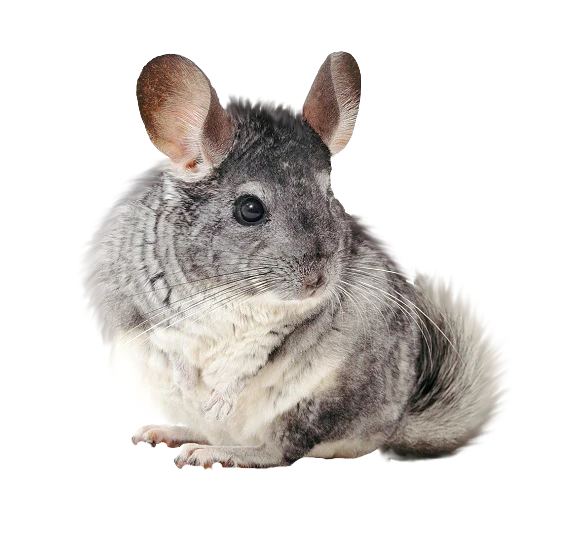
Chinchillas: Fluffy personalities with big demands
Share
Chinchillas – these adorable, fluffy furballs with big ears and even bigger personalities! At first glance, they might seem like easy pets: a cage, some food, and you're done. Nothing could be further from the truth! These jumping acrobats have unique needs and quirks. Don’t worry – we’ll explain everything you need to know about their care, challenges, and potential problems – with a touch of humor and lots of knowledge.
Chinchillas in Nature: A Quick Overview
Chinchillas originate from the rugged mountainous regions of the Andes in South America. There, they hop from rock to rock at great heights, protected by their incredibly dense fur. And when we say "incredibly dense," we mean it: from a single hair follicle, 50 to 80 hairs grow – for humans, it’s just one. This fur is their greatest treasure but also the reason why they are so sensitive. No wonder they have high demands.
Housing: Luxury Apartment Instead of a Mini Cage
If you think a simple cage is enough, it’s time for a new plan. Chinchillas are extremely active, curious, and intelligent. Their living space needs to offer plenty of room, variety, and climbing opportunities.
The Cage: A Multi-Level Dream Home
Chinchillas love to jump, climb, and explore. The minimum dimensions for a cage are 100 x 50 cm, but a larger enclosure with at least 150 cm height is better. Chinchillas need movement and various levels to stay healthy and happy.
- Material: The cage should be sturdy and made of non-toxic metal. Wooden elements are welcome but must be untreated and non-coated – chinchillas love to chew on everything.
- Location: Place the cage in a quiet spot, away from direct sunlight and drafts. Chinchillas feel comfortable at temperatures between 10–20°C – above 25°C can be dangerous!
Setup: The Chinchilla Playground
A cage setup includes more than just a food bowl and water. A happy chinchilla needs:
- Houses: Hideouts for sleeping and retreating.
- Climbing Options: Ramps, branches, and hammocks to provide movement and fun.
- Sand Bath: Chinchillas clean their fur by rolling in special sand. Provide a sand bath daily for 20–30 minutes, but don’t leave it permanently in the cage, as it will quickly become a toilet.
Free Roaming: Time for Adventure
A few hours of daily free roaming in a secured room are a must. Make sure all cables, plants, and valuable furniture are out of reach – chinchillas are true masters of gnawing.
Diet: Gourmet Instead of Fast Food
Chinchillas have a very sensitive digestive system and are absolute hay lovers. An improper diet can quickly lead to serious health problems.
- Hay: The foundation of their diet. It’s their daily "staple food" and ensures healthy digestion.
- Pellets: High-quality chinchilla pellets complement the hay. Avoid products with added sugar or low-quality fillers.
- Treats: Less is more. A small piece of dried apple or a hazelnut per week is enough. Too many treats can throw their delicate digestion out of balance.
- Water: Always provide fresh and clean water. A drinking bottle is more hygienic than a bowl.
Health: Small but Sensitive
Chinchillas are not "low-maintenance" pets. They need regular observation and sometimes a visit to the vet. Here are some of the most common health issues:
1. Dental Problems: Lifelong Growth
Chinchilla teeth grow throughout their lives. If not properly worn down, they can become too long and cause pain.
- Symptoms: Drooling, loss of appetite, weight loss.
- Solution: Always provide suitable chewing materials, such as apple or hazel branches. If problems occur: visit the vet.
2. Digestive Issues: Sensitive Stomach
An improper diet or sudden food changes can lead to diarrhea or constipation.
- Symptoms: Little or no feces, bloated abdomen.
- Solution: Always provide fresh hay and avoid excessive treats. If symptoms persist: seek veterinary help.
3. Reproductive Infections: Not Just for Mothers
Uterine infections can also occur in females that have never been pregnant. Bacterial infections, hormonal issues, or stress are often the cause.
- Symptoms: Loss of appetite, discharge, lethargy.
- Solution: Hygiene and regular veterinary check-ups.
4. Overheating: Fluffy but Heat-Sensitive
Chinchillas do not tolerate heat well. Temperatures above 25°C can quickly become dangerous.
- Solution: Ensure a cool location and use special cooling mats in summer.
Personality: Diva Meets Athlete
Chinchillas are true personalities. They are:
- Nocturnal: They rest during the day and run marathons in the cage at night.
- Sensitive: Too much noise or touch? Drama guaranteed.
- Stubborn: Lovable, but petting? Only when they feel like it.
Conclusion: Fluffy Adventures with Challenges
Chinchillas are sweet, funny, and incredibly soft – but also demanding. For people willing to give them the care and attention they need, they can become wonderful companions. Remember: Life with a chinchilla is an adventure full of humor, love, and… fur. 🐾
